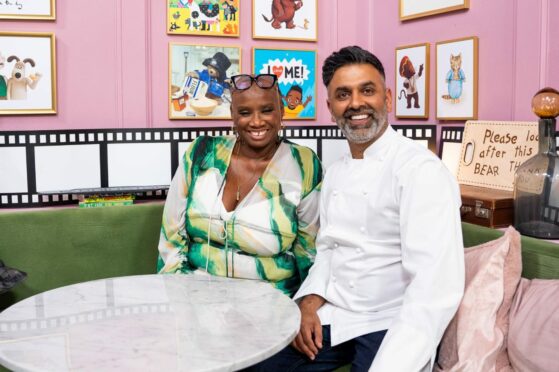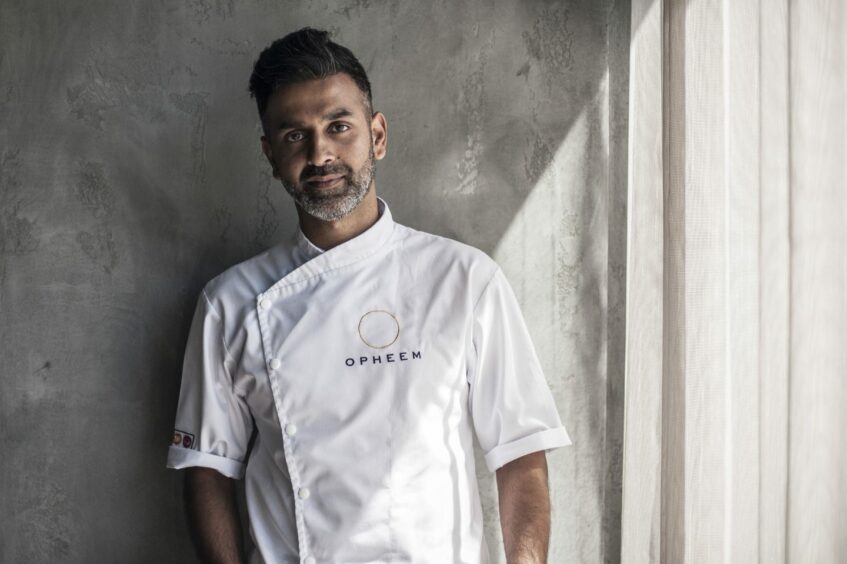
Chef Aktar Islam still remembers one of the harshest critiques he’s ever received for his food.
When competing on the Great British Menu for the first time in 2011, judge Glynn Purnell “said they wish they could eat the packaging, as opposed to the actual dessert”, the chef remembers with a groan.
“It came from Glynn – who’s actually a close personal friend – and, ultimately, that’s what good friends are supposed to do. Be honest with you, ground you, and give you a true representation.”
It might have seemed harsh at the time, but Islam took it as a positive: “Obviously it worked for me, because I went on and won.”
The chef, 42, won the regional round of that series, as well as taking home the prize for best fish dish in the finale. Now, Islam is in his second year of being on the other side of things after returning to the Great British Menu kitchen as a judge and setting social media alight with his low scores.
“What a lot of people don’t understand – our role (as a judge who helps coach the competitors) is to present the best two chefs from that region to the judges, but also to shape those two chefs so they can represent their best selves as well,” he says.
“The only way you’re going to get to that stage is (by) being honest. If I told them everything’s fine, there’s no room for me to give them feedback or coach them.”
Islam might have come across as harsh on TV, but you can’t deny he puts the work in.
“I spent a good six hours or so with both the contestants who made it through to the judges’ chamber, going through all of their recipes, all of the ingredients lists, rewriting some of the recipes, processes, coaching them through bits where they needed assistance on techniques, and so forth,” he says – to put them in “the best possible position”.
If it looks like Islam is pushing the contestants hard, it’s because he expects the same from himself.
After dropping out of school as a teenager, he started working in his father’s restaurant, before working at various other “mediocre, run-of-the-mill curry restaurants for a good few years”, he says – eventually deciding “I wanted more”.
Islam recalls: “I wanted more for myself. I put myself in environments where I was an outsider, or I’d always be starting off at the bottom and learning my way. A lot of that came from people around me who were honest enough to give me honest – and quite brutal – feedback, which I took to make myself better. That’s why I feel honesty is one of the best things you can do to a chef.”
In October 2019, Islam’s Birmingham restaurant, Opheem, became the first non-London Indian restaurant in England to receive a Michelin star. And that could be down to the mantra he and his team adopt: “Don’t be sorry, just be better.”
Islam says: “If you make mistakes it’s quite easy to say I’m sorry, and move on. But that’s your time to then be better. The journey is all about bettering yourself and owning your mistakes.”
A big part of Islam’s approach is giving back. In 2022, he gave away 6,000 curry boxes to those in need, and he’s keen to support young people who might not have many opportunities available to them.
He says: “The businesses are mine – they are a reflection of me and my personality and who I am as a person. So, rightfully, they should reflect not just my personality, but my principles.”
Of growing up in inner-city Birmingham, Islam says: “I came from nothing. I come from one of the most deprived areas in the country – I grew up in poverty and life’s treated me well, but that’s come to me through hard work.”
Now, he feels compelled to share his success, with Opheem and his delivery business Aktar At Home giving opportunities to young adults – particularly those who come from challenging backgrounds.
“It’s important for us to create opportunities for these people,” he says. “It empowers them to feel they are relevant members of society, and they can then go on to do great things – whether that be within the business or outside of it.”
Great British Menu, BBC2, Monday, 9pm, Tues-Thurs, 8pm, Friday, 9pm

Enjoy the convenience of having The Sunday Post delivered as a digital ePaper straight to your smartphone, tablet or computer.
Subscribe for only £5.49 a month and enjoy all the benefits of the printed paper as a digital replica.
Subscribe © PA Photo/Opheem
© PA Photo/Opheem